-
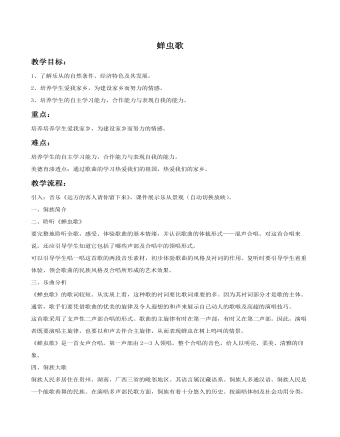
《蝉虫歌》教案
教学流程:引入:音乐《远方的客人请你留下来》,课件展示乐从景观(自动切换放映)。一、侗族简介二、聆听《蝉虫歌》要完整地聆听全歌,感受、体验歌曲的基本情绪,并认识歌曲的体裁形式——混声合唱。对这首合唱来说,还应引导学生知道它包括了哪些声部及合唱中的领唱形式。可以引导学生唱一唱这首歌的两段音乐素材,初步体验歌曲的风格及衬词的作用。复听时要引导学生着重体验、领会歌曲的民族风格及合唱所形成的艺术效果。三、乐曲分析《蝉虫歌》的歌词较短。从实质上看,这种歌的衬词要比歌词重要的多。因为其衬词部分才是歌的主体。通常,歌手们要凭借歌曲的优美的旋律及令人遐想的和声来展示自已动人的歌喉及高超的演唱技巧。这首歌采用了支声性二声部合唱的形式。歌曲的主旋律有时在第一声部,有时又在第二声部。因此,演唱者既要演唱主旋律,也要以和声去伴合主旋律,从而表现蝉虫在树上鸣叫的情景。《蝉虫歌》是一首女声合唱。第一声部由2—3人领唱。整个合唱的音色,给人以明亮、柔美、清雅的印象。
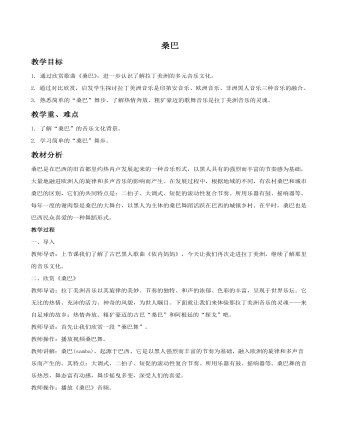
《桑巴》教案
教学过程一、导入教师导语:上节课我们了解了古巴黑人歌曲《依内妈妈》,今天让我们再次走进拉丁美洲,继续了解那里的音乐文化。二、欣赏《桑巴》教师导语:拉丁美洲音乐以其旋律的美妙、节奏的独特、和声的浓郁、色彩的丰富,呈现于世界乐坛。它无比的热情、充沛的活力、神奇的风貌,为世人瞩目。下面就让我们来体验那拉丁美洲音乐的灵魂——来自足球的故乡:热情奔放、粗犷豪迈的古巴“桑巴”和阿根廷的“探戈”吧。教师导语:首先让我们欣赏一段“桑巴舞”。教师操作:播放视频桑巴舞。教师讲解:桑巴(samba),起源于巴西,它是以黑人强烈而丰富的节奏为基础,融入欧洲的旋律和多声音乐而产生的。其特点:大调式、二拍子、短促的滚动性复合节奏。所用乐器有鼓、摇响器等。桑巴舞的音乐热烈,舞态富有动感,舞步摇曳多变,深受人们的喜爱。 教师操作:播放《桑巴》音频。教师导语:让我们大家一起随着音乐跳起来吧!学生活动:边听音乐边拍打节奏,学做简单的“桑巴”舞蹈动作,并随音乐跳舞。三、课堂小结本节课通过欣赏乐曲《桑巴》,同学们进一步的了解认识了拉丁美洲的多元音乐文化。又通过对比欣赏,启发学生探讨了拉丁美洲音乐是印第安音乐、欧洲音乐、非洲黑人音乐三种音乐的融合。
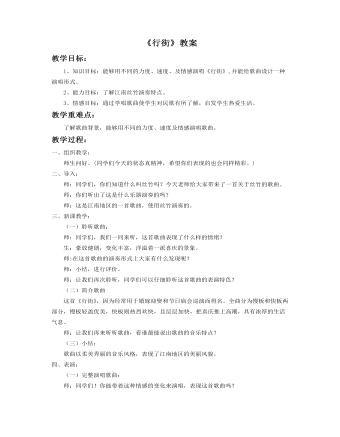
《行街》教案
教学过程:一、组织教学:师生问好。(同学们今天的状态真精神,希望你们表现的也会同样精彩。)二、导入:师:同学们,你们知道什么叫丝竹吗?今天老师给大家带来了一首关于丝竹的歌曲。师:你们听出了这是什么乐器演奏的吗? 师:这是江南地区的一首歌曲,使用丝竹演奏的。 三、新课教学: (一)聆听歌曲: 师:同学们,我们一同来听,这首歌曲表现了什么样的情绪? 生:豪放健朗,变化丰富,洋溢着一派喜庆的景象。师:在这首歌曲的演奏形式上大家有什么发现呢? 师:小结,进行评价。 师:让我们再次聆听,同学们可以仔细聆听这首歌曲的表演特色?(二)简介歌曲这首《行街》,因为经常用于婚嫁迎娶和节日庙会巡演而得名。全曲分为慢板和快板两部分,慢板轻盈优美,快板则热烈欢快,且层层加快,把喜庆推上高潮,具有浓厚的生活气息。 师:让我们再来听听歌曲,看谁最能说出歌曲的音乐特点? (三)小结: 歌曲以柔美秀丽的音乐风格,表现了江南地区的美丽风貌。四、表演: (一)完整演唱歌曲: 师:同学们!你能带着这种情感的变化来演唱,表现这首歌曲吗?
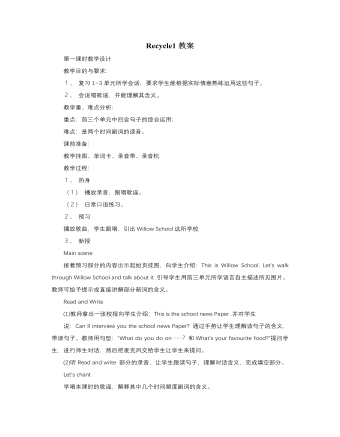
人教版新课标PEP小学英语五年级上册Recycle1教案
巩固延伸尝试与他人进行书信交流第三课时教学设计教学目的与要求:1、 能够使用所学四会句子完成Task time中的采访任务。2、 能够理解Let’s play中的问题并做出正确回答。3、 能够听懂、会唱歌曲“My Favourite Day”。教学重、难点:重点、难点为复习并使用四会句子完成Task time中的采访任务,并展示个人报道。课前准备:教学挂图、录音带、录音机、简历表教学过程:1、 热身(1) 放第二单元歌曲,学生跟唱,复习有关一周七天的单词。(2) 日常口语练习。2、 预习:放录音,欣赏歌曲。3、 新授Task time(1) 就歌曲内容向学生提问:Do you like weekends? What’s your favourite day? 引导学生回答:My favourite day is Saturday/Sunday. 并请学生说明理由,表述周末活动。出示采访表,回答问题。(2) 让学生参照学生用书的采访表进行小组交流,并在最短的时间内填充表格,然后每组派代表做汇报。Let’s play看图片,指导学生先读懂句子,再回答问题。Let’s sing学生理解并学唱本单元歌曲“My Favourite Day”.巩固延伸:采访教师;画画猜人
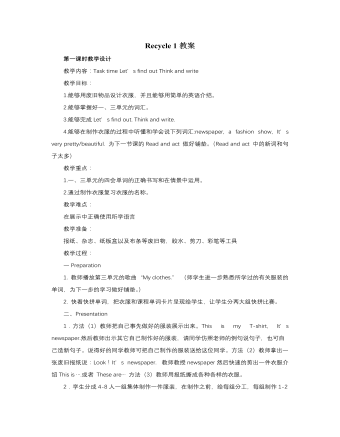
人教版新课标PEP小学英语四年级下册Recycle 1教案
1.Think and write接上一个环节,老师说“Zoom is careless. Where are his things? Let’s look.” 让学生看课本图片,认真观察。a. 教师给出例句,请同学仿照例句说出句子Zoom’s red shoes are in the library.Zoom’s green sweater is in the gym.b.学生完成课本图片后的短文。可以找程度好的同学在黑板上书写。c.让学生在小组内朗读句子。2. Let’s read..出示钟表模型,老师拨出几个有代表性的时间,学生分两组用“What time is it ? It’s ........It’s time to ……”进行问答。老师在学生回答时把时间和活动写在黑板上如下:Time Activities7:00 get up 7:30 go to school9:00have Chinese/math class10:00read books 或其他12:00 eat lunch3:15have P.E classOh, you have a busy day. Look, this is John’s day.a. 由上个环节引出John’s list. 教师引导学生仔细看Let’s read 部分的图,阅读John的活动时间表, 然后独立完成句子的正误判断,最后进行检查。b.让学生再次读John的活动时间表,回答下面的问题:What time does John go to school? Where does John read books?
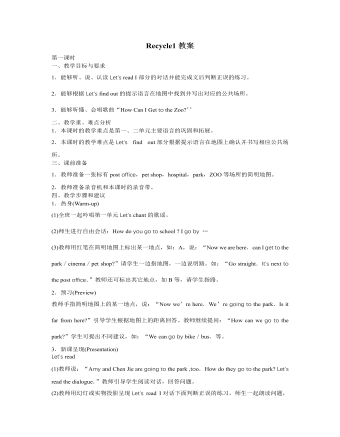
人教版新课标PEP小学英语六年级上册Recycle1教案
1.热身(warm-up) (1)全班齐唱歌曲“How call I Get to the Zoo?’’ (2)师生一起吟唱第一单元的歌谣,要求学生一边吟唱,一边用手打节拍。 2.预习(Preview) 教师对学生有关My Dream Vacation的短文做出总体评价,并请几名写得有创意的学生朗读他们的短文,教师针对其内容提问,如:“Where are you going? What are you going to do? How are you going to there等。教师根据课前的准备,在最后一名学生朗读完文章并回答了问题以后,简化并板书该学生的回答,将其改编成为一首小歌谣,如: Where are you going? What are you going to do? I’m going to the ZOO to see the monkeys. I’m going by bike.I’m going On foot. I live near the ZOO.So I won’t take a train. 教师拍节拍示范朗读自己改写的新歌谣,学生模仿吟唱新歌谣。 3.新课呈现(Presentation) Let’s chant 在以上活动的基础上,教师放Let’s chant部分的录音,学生静听并试着跟读,再看着文字吟唱。师生可进行问答式吟唱,并在小组间展开比赛。 Listen and match

新人教版高中英语必修3Unit 5 the value of money-Reading For Writing教学设计一
【参考范文】Narrator:(Henry is smiling as he leaves the restaurant. As he is walking down the street, he sees a sign for a place that cuts hair. He decides to get it cut. )H=Henry;B=Barber;R=rude manH:Good afternoon, I'd like to get a cut, if I may. (The barber looks at Henry's hair and continues cutting another man's hair. )Er, I'd really like a haircut. As you can see it's much too long. B:(in a rude manner) Yes, I can see that. Indeed, I can. H:Fine, well I'll have a seat then. (He sits in one of the barber's chairs. The barber turns to look at Henry. )B:It's quite expensive here, you know!Are you sure you can afford it?H:Yes. I think so. (In comes the rude man. )R:Hey you there. I need a haircut quickly. Can you do me straightaway?B:All right, then, get in the chair and I'll see what I can do. R:Thank you. (sits down in one of the barber's chairs)H:Excuse me, but I was here first. Aren't you going to do my hair first?B:This man's in a hurry. H:Well so am I!I insist that you cut my hair first. B:OK, but I'll have to be quick. This gentleman is waiting. H:Thank you. (They both become quiet. After his hair is cut, the barber tells Henry how much he must pay. Henry shows the barber the bank note. )B:Why, Mr . . . (looks shocked)H:Adams. Henry Adams. I'm sorry, I don't have any change. R:You're that Mr Adams! Well,I'm glad I waited or I might never have known it was you. B:Why, Mr Adams, please don't worry!(wearing a big smile) Nothing to worry about!Nothing at all!Please come back any time, even if you only need too little hairs cut!It will be my honour to serve you!

新人教版高中英语必修3Unit 5 The Value of Money-Listening &Speaking&Talking教学设计
4. A:We’d like to have someone to say a word at the beginning to welcome the group.B:↙Who?A:We thought that you or Dr.Johnson might do it.B用降调说Who,其意思是问,对方想让谁在开场时致欢迎词。Step 6 Pronunciation---Practice1. Listen to the short conversation and mark the intonation with ↗, ↙ or ↙, ↗. Then discuss with a partner what they intend to convey by using different intonation.Owner: You know what ?↗ It’s a million-pound bank note↙.Waiter 1: Really ?↗(question)Waiter 2: Really !↙(unbelievable and surprised)Waiter 3: Really ?!↙↗(first question then surprised)2. Listen to the conversations. Underline the parts that are stressed and mark the intonation. Then talk about the implied meanings of the responses with different intonations. Listen again and repeat.1) Henry: It’s a nice suit.Owner: Oh, it’s perfect!↙(The intonation means it is very suitable for Henry.)2) Henry: Well, that’s very kind of you.Owner: Kind, sir ?↗(what you said is not right) No, it’s kind of you. You must come whenever you want and have whatever you like. Just having you sit here is a great honour !!↙(welcome you to come again)3)Henry:Well, to be honest, I have none. Oliver:(happily) What luck!(excited) Brother↗, what luck!↙(It means “Didn’t you hear it?”)Henry: Well, it may seem lucky to you but not to me!↗(angry) If this is your idea of some kind of joke, I don’t think it’s very funny. Now if you’ll excuse me, I ought to be on my way.↙(If so, I would leave.)Roderick: Please don’t go↙...(hope Henry can wait for a moment)Part B Viewing and Talking---Describe people’s changing attitudes in a film clipStep 1 Before-listening---Tell the filmYou are going to watch part of the film The Million Pound Bank Note. Look at these photos and guess what happens in the film.

新人教版高中英语必修3Unit 5 The Value of Money-Listening &Speaking教学设计
Step 4: Listen again and decide if the following statements are true (T) or false (F).1 It was the first time Chen Liyan's story was reported. T口 F口2 Chen found 10,000 yuan in a small plastic bag in Taiyuan railway station口 F口3 Wang Zheng apologized to Chen because he couldn't offer her more money. T口 F口4 Chen took out a large loan to cure her daughter, T口 F口5 Wang set up a fundraising website for Chen's daughter after Chen told him about her situation. T口 F口Step 5:After listening, discuss the questions.1 What kind of person do you think Chen Liyan is?Chen Liyan is generous and honest because she returned a large sum of money to the owner.2 Did Chen return the money because she didn't need it?No. She returned the money because it was the right thing to do. Evidence for this is that she refused to accept the reward money because she felt that it had not been earned. 3 Is it common for people to do what Chen did?It depends on the culture. In some countries it is quite common to return money that has been found. In other countries, people believe "Finders are keepers!" 4 How did Wang Zheng feel about the return of his money?He must have been very happy and relieved to have gotten his money back. We know this because he thanked Chen repeatedly and even offered her a reward.5 Why did Ma Dongbao tell Wang about Chen's family?He must have had great sympathy for Chen and her daughter and wanted to help them.'We know this because he arranged help for them. 6 How did the news reporter feel about Chen's actions?The news reporter felt that it showed that money wasn't the most important thing in life. We know this because the reporter told us that this is what Chen believes. and then said, “that's a great attitude to take."

新人教版高中英语必修3Unit 5 The value of money-Reading and Thinking教学设计二
? Could you offer me some kind of work here?? I don’t want your charity, I just want an honest job.? Careless: I landed in Britain by accident.Step 7:Consolidation.? Find Henry? Roderick and Oliver were I .making a bet when they saw Henry, a poor young man. ? Know Henry? About a month ago, Henry was sailing and later he found himself carried out to sea by a strong wind. Fortunately, he 2.was spotted by a ship. And it was the ship that brought him to 3.England? Offer money to Henry ? Oliver and Roderick gave Henry a letter and told him that there was money in it. They 4.persuaded him to accept it, and made him 5.promise that it wouldn't be opened until 2 o'clock.Step 8:Language pointsa large amount of: a large quantity of; a great deal ofe.g. They bought a large amount of furniture before they moved their new house.make a bet: make an arrangement to risk money, etc. on an event of which the result is doubtful.e.g. We made a bet on the result of the match.permit sb to do something: allow somebody to do somethinge.g. My mother doesn’t permit me to ride in the street after it rained.by accident: as a result of chancee.g. I only found it by accident.stare at: look at somebody or something with the eyes wide open in a fixed gaze( in astonishment, wonder, fear, etc)to be honest: to tell you the truth; to be franke.g. To be honest, I don’t think we have a chance of winning.Step7 Homework:What do you think will happen to Henry? Will the bank-note help him or get him into trouble?

新人教版高中英语必修3Unit 5 The Value of Money- Discovering Useful Structure教学设计
Step 3 Meaning1. 过去将来时表示从过去某一时间来看将要发生的动作或存在的状态, 常用在宾语从句中。一般由“would/should +动词原形”构成。She hoped that they would meet again someday. 她希望将来有一天他们能再见面。2. was/were going to+动词原形: 表示过去将要发生或很有可能发生的动作, 常用于口语中, 表示预言、意图或者打算等。He was going to start work the following week. 他打算下星期开始工作。3. was/were about to do: 常用来表示即将发生的动作, “刚要/正要做……”。注意该结构不与任何时间状语连用。I felt that something terrible was about to happen. 我感到某种可怕的事情即将发生。4.was/were to do: 表示“曾计划做某事”, 如果表示“本来计划做某事, 动作没实现”, 则需用 “was/were to have done”。She said she was to have told me about the accident. 她说她本来想告诉我关于事故的事。5.Start, go, come, leave, see, meet等动词的过去进行时: 表示就过去某一时刻而言即将发生的动作。She was coming later. 她随后就来。I had just put on my overcoat and was leaving to visit a friend of mine. 我刚穿上外套要去看我的一个朋友。

新人教版高中英语必修3Unit 5 The Value of Money-Reading and Thinking教学设计一
Everybody wants to get wealth.In today’s material world,making money or becoming wealthy symbolizes a person’s success and capability. Many people just make every effort, pay any price to attain greater wealth. With money,they can buy nice, large apartments in nice neighborhood. With money they can own luxurious cars. Wealth seems to bring all happiness in life.But is wealth the only road to happiness? Not really. There are many things in the world, which are beyond the means of money, such as friendship, love, health and knowledge. People are so preoccupied with struggling for money that they have no time or would not take the time to form or maintain friendship. What happiness can they feel living as lonely miserable creatures without love or friends in the world even if they accumulate tremendous wealth?In my opinion, people can’t do anything without money, but money is not everything. What money will bring you depends on your personal belief and goal in life. If you are kind enough to help others, especially the poor, money is a good thing to you. With it, you can do much more for the benefit of people and your country, and it will add to your own happiness. If you want money just for your own needs, you’ll never be satisfied or happy. In a word,you should have money spent for more people. Only then can money be the source of your happiness.Step 8 Homework4 students in a group, one acts Roderick, one Oliver, one servant and the fourth one acts Henry Adams, then listen to the tape, pay more attention to the difference between American English and British English in pronunciation, stress, tone.

新人教版高中英语必修3Unit 5 The Value of Money-Reading for Writing教学设计二
2. 您能看到, 我头发太长了。You can see that my hair is much too long.3. 无论什么时候, 只要您想回来就回来。Please come back whenever you want.4. 您仅有很少的头发要理! You only have too little hair to cut !5. 为您服务是我的荣幸!It is my honour to serve you!Step 9 Writing(Henry is walking down the street when he sees a sign for a place that cuts hair. He decides to have it cut. )H=Henry B=BarberH: Good afternoon, I’d like to have my hair cut, if I may. (The barber looks at Henry’s hair and continues cutting another man’s hair. ) Er, I’d really like a haircut. As you can see it’s much too long. B: (in a rude manner) Yes, I can see that. Indeed, I can. H: Fine, well, I’ll have a seat then. (He sits in one of the barber’s chairs. The barber turns to look at Henry. )B: It’s quite expensive here, you know! Are you sure you can afford it?H: Yes. I think so. (After his hair is cut, the barber tells Henry how much he must pay. Henry shows the barber the bank note. )B: Why Mr. . . (looks shocked)H: Adams. Henry Adams. I’m sorry. I don’t have any change. B: Please don’t worry! (wearing a big smile) Nothing to worry about! Nothing at all! Please come back whenever you want, even if you only have too little hair to cut! It will be my honour to serve you!Step 10 Pair workExchange drafts with a partner. Use this checklist to help your partner revise his/her draft.1. Are all the elements of a play included and in good order ?2. Do the character use suitable language ?3. Are the stage directions clear and useful ?4. Is the plot clear and exciting enough ?
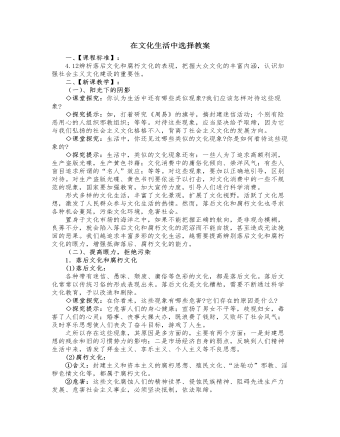
人教版高中政治必修3在文化生活中选择教案
◇小辞典:绿色阅读随着知识经济时代的到来,全球化信息浪潮正铺天盖地席卷而来。尤其足随着我国加入世贸组织由梦想变为现实,同国外进行频繁而广泛的经济文化交流,在所难免。在大量文化信息面前,就像物质生活中倡导绿色食品一样,对于精神食粮,也应该倡导绿色阅读。绿色阅读,是一种无污染的有利于人健康文明生活的阅读。文化就像大自然那种绿色带给我们永久愉悦一样,它是高科技竞争中源源不断地给我们充电的高效营养库,是一个沙漠中穿行人身心交瘁时望到的一片绿洲,是一个人葆有的、没有受到任何污染的、永远都清如许的“半亩方塘”。◇课堂练习:在我国,必须大力倡导“爱国守法、明礼诚信、团结友善、勤俭自强、敬业奉献,的基本道德规范。这些基本道德规范()①是我国社会主义文化建设的重要内容②是我国社会主义社会的重要特征③是我国社会主义道德的重要体现④是社会主义经济建设的唯一精神动力
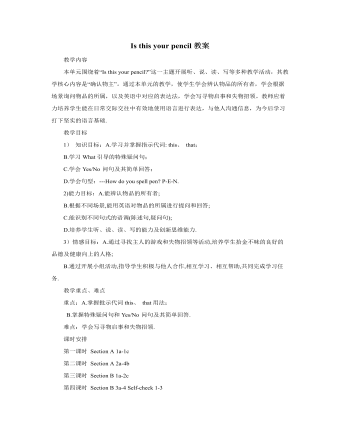
人教版新目标初中英语七年级上册Is this your pencil教案
T: Please look at the pictures and learn the new words.(用多媒体展示新单词效果较好。)1.at prep. 在(里面或附近);在(点刻);2.theart.表示特指的人、物、事或群体 3.lostadj.丢失的;遗失的4.Found adj. (find的过去式、过去分词)找回的5.lost and found 失物招领6.please adv.请7.school n. 学校8.a set of一套;一副(Teach students to read the words.)2. Practice the new words. (事先录制一段短的听力,让学生通过听的训练来强化所学的新单词,并为学习写寻物启示和失物招领作好准备。)T: Please listen to a short passage twice then fill the blanks using the words we learned.(Show students a short passage and play the recording for the students to listen.)There are many things in (1)_____________________in my (2)__________. Look, here’s (3)_________keys. Is this yours? (4)__________call Jim (5)___________753-2289.Typescript:There are many things in the Lost and Found in my school. Look, here’s a set of keys. Is this yours? Please call Jim at 753-2289.
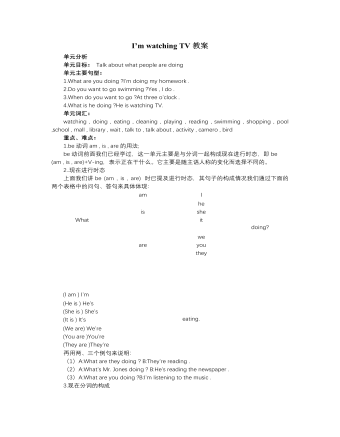
人教版新目标初中英语七年级下册I’m watching TV教案
单元分析单元目标: Talk about what people are doing 单元主要句型:1.What are you doing ?I’m doing my homework .2.Do you want to go swimming ?Yes , I do .3.When do you want to go ?At three o’clock .4.What is he doing ?He is watching TV. 单元词汇:watching , doing , eating , cleaning , playing , reading , swimming , shopping , pool ,school , mall , library , wait , talk to , talk about , activity , camero , bird 重点、难点:1.be动词am , is , are的用法;be动词前面我们已经学过,这一单元主要是与分词一起构成现在进行时态,即be (am , is , are)+V-ing,表示正在干什么。它主要是随主语人称的变化而选择不同的。2..现在进行时态上面我们讲be (am , is , are) 时已提及进行时态,其句子的构成情况我们通过下面的两个表格中的问句、答句来具体体现:3.现在分词的构成现在进行时态中be + V - ing 的构成中V-ing被称为现在分词,它的基本构成是动词原形+ing,但也有些特殊情况,下面分几类说明:(1)一般情况+ing如:read→reading,go→going,do→doing,look→looking,listen→listening,watch→watching.(2)以不发音的e结尾的词,去掉e,再加ing.如:write→writing,skate→skating,type→typing,wake→waking,make→making
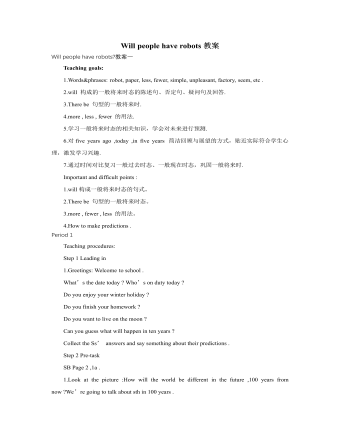
人教版新目标初中英语八年级下册Will people have robots教案
Teaching goals:1.Words&phrases: robot, paper, less, fewer, simple, unpleasant, factory, seem, etc .2.will 构成的一般将来时态的陈述句、否定句、疑问句及回答.3.There be 句型的一般将来时.4.more , less , fewer 的用法.5.学习一般将来时态的相关知识,学会对未来进行预测.6.对five years ago ,today ,in five years 简洁回顾与展望的方式,贴近实际符合学生心理,激发学习兴趣.7.通过时间对比复习一般过去时态、一般现在时态,巩固一般将来时.Important and difficult points :1.will构成一般将来时态的句式。2.There be 句型的一般将来时态。3.more , fewer , less 的用法。4.How to make predictions .Period 1Teaching procedures:Step 1 Leading in1.Greetings: Welcome to school .What’s the date today ? Who’s on duty today ?Do you enjoy your winter holiday ?Do you finish your homework ?Do you want to live on the moon ?Can you guess what will happen in ten years ?Collect the Ss’ answers and say something about their predictions .Step 2 Pre-taskSB Page 2 ,1a .1.Look at the picture :How will the world be different in the future ,100 years from now ?We’re going to talk about sth in 100 years .
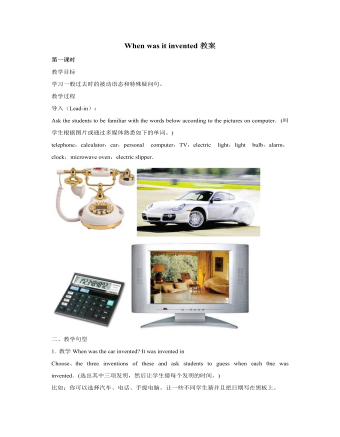
人教版新目标初中英语九年级下册When was it invented教案
二、教学 1a,1b.1.First the teacher asks the students what kind of fruit food and drink you like the best and writes down on the blackboard.教师问学生最喜欢什么水果和饮料并把它们写在黑板上。比如:potato chips,ice cream,tea,lemon,chocolate,oranges,salad,popcorn,pickle and so on.2.接着叫学生表达以上食物的味道,引出新单词——sweet,crispy,salty,sour,delicious,hot,awful,nice…并且完成lb教学内容通过此活动,以旧带新引入新单词。其目的是让学生自主学习新知识。 三、教学 2a,2b1.首先,听力前的brainstormFirst,Let students describe how potato chips taste and describe how helpful the potato chips.Then,ask:When and where were potato chips invented?Who were potato chips invented by?How were potato chips invented?(Let students guess according to the following key words.)Key words:by accident,customer,restaurant,by mistake.(说明:通过问题让学生对对话内容有整体了解,为听力练习做好准备;又培养学生的注意力,想像力,观察力。)
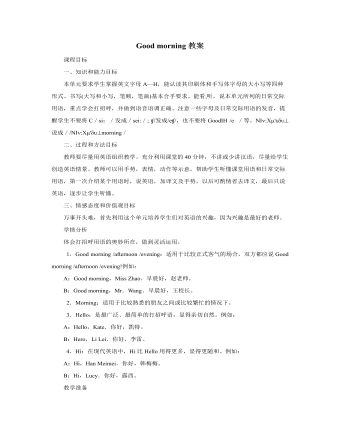
人教版新目标初中英语七年级上册Good morning教案
一、知识和能力目标本单元要求学生掌握英文字母A—H,能认读其印刷体和手写体字母的大小写等四种形式。书写(大写和小写,笔顺,笔画)基本合乎要求。能看,听,说本单元所列的日常交际用语,重点学会打招呼,并做到语音语调正确。注意一些字母及日常交际用语的发音,提醒学生不要将C/si:/发成/sei:/; ?/发成/e?/,也不要将Good?H /e /等。??????'????说成/???????'???morning/二、过程和方法目标教师要尽量用英语组织教学。充分利用课堂的40分钟,不讲或少讲汉语,尽量给学生创造英语情景。教师可以用手势,表情,动作等示意,帮助学生听懂课堂用语和日常交际用语,第一次介绍某个用语时,说英语,加译文及手势,以后可酌情省去译文,最后只说英语,逐步让学生听懂。
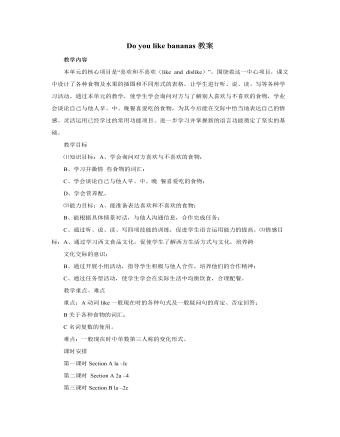
人教版新目标初中英语七年级上册Do you like bananas教案
教学目标 ⑴知识目标:A、学会询问对方喜欢与不喜欢的食物; B、学习并激情 些食物的词汇; C、学会谈论自己与他人早、中、晚 餐喜爱吃的食物; D、学会营养配。 ⑵能力目标:A、能准备表达喜欢和不喜欢的食物; B、能根据具体情景对话,与他人沟通信息,合作完成任务; C、通过听、说、读、写四项技能的训练,促进学生语言运用能力的提高。⑶情感目标:A、通过学习西文食品文化,促使学生了解西方生活方式与文化,培养跨 文化交际的意识; B、通过开展小组活动,指导学生积极与他人合作,培养他们的合作精神; C、通过任务型活动,使学生学会在实际生活中均衡饮食,合理配餐。 教学重点、难点 重点:A动词like一般现在时的各种句式及一般疑问句的肯定、否定回答; B关于各种食物的词汇; C名词复数的使用。 难点:一般现在时中单数第三人称的变化形式。